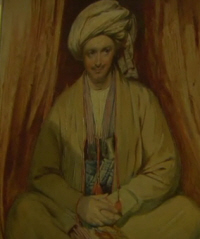Alexander Burnes
William Dalrymple

Alexander Burnes
Sensing that two great empires would collide in Afghanistan, the British government was hungry for intelligence on this blank space. A spy was dispatched. Alexander Burnes, a man I believe to be one of our greatest ever political officers.
This is not a man actually in fancy dress. He’s in disguise. One of dozens of British officers who made their reputations during journeys which were almost suicidal. Burnes was one of the very first to study Afghanistan for British intelligence. His spying mission was both extraordinary and brave.
In 1831, travelling undercover in disguise, he surveyed the route all the way from India through Kabul to Bukhara, and produced the first detailed accounts of Afghan politics. He set off with no protection into one of the most dangerous and unknown parts of Asia, a place where his predecessors had been killed, where he was having to run the gauntlet of slave traders, where he was a Christian moving through some regions which were fanatically Muslim and which were famous for killing infidels.
Trying to rely all the way, not on his sword but, as he says in a letter to his mother – on his languages, on his charm, on his politeness. Along with the suicidal danger of what Burnes did was the incredible reward because, when he returned back to London having completed this journey, this nearly 12-month journey through largely unknown country, he was a massive celebrity.
He returned, 28 years old, had an audience with the King, was made a member of the Athenian Club, got a gold medal from the Royal Geographical Society. And the book Burnes wrote, ‘Travels to Bukhara’, became an overnight bestseller.
But, although it gave Britain a unique insight into this largely unknown land, according to historian William Dalrymple, his visit also terrified the Russians and had an unanticipated, counter-productive effect.


